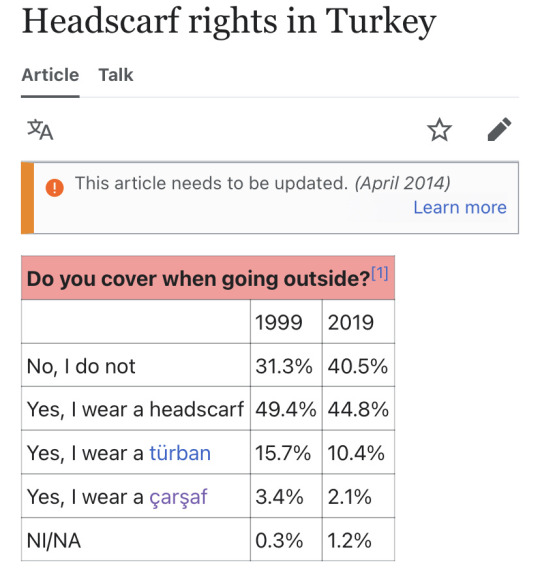#And of COURSE countries that aren't western Europe have it even harder I'm just personally invested in Scotland
Explore tagged Tumblr posts
Note
I'm a 17yo hijabi living in Turkey. It's been 2 years since i've discovered about radical feminism and i'm slowly studying more about it. But i feel like i can't let go of my religion. I know that muslim societies are HIGHLY male centric and misogynistic but i still believe that there's a god and that's why i can't blame the "true" Islam if it ever existed. My parents aren't strictly oppressive, I wasn't forced to wear hijab but of course i know that they wouldn't be ok with me taking it off. I've been thinking about many things and decided that i wouldn't take off my hijab even if i become completely non-religious as long as hijabi women continue to get discriminated. I don't wanna stop wearing hijab until no hijabi gets acid-attacks in europe. until no hijabi gets denied at work or school because of her hijab. Even if i take off my hijab there'll be other women who would still wear it because of their religion or family and i want to stand by them
I don't know where i'm going with this but i just wanted to hear your thoughts about it cuz i think the topic is something harder than "just take it off" that could be said by white feminists
i have a few thoughts on this. i don’t think any of the religions im aware of are inherently bad bc religion rly is ultimately what we make of it, although i do think it’s ultimately all bullshit and a means of mass control. so i don’t think whether you decide to leave islam or not is anything beyond a personal choice. with that said, i do have some contentions with what you mentioned.
for one, do you not think someone choosing to wear the hijab at one point being expected to never take it of is a form of force too? i think it’s a pretty big issue that girls are encouraged to wear the hijab, and when they “choose” to (highly debatable considering what we’re taught about our value + our belonging in heaven or hell depending on whether we wear the hijab or not), then they’re no longer allowed to take it off for the rest of their lives. many girls “choose” to wear it when they’re 11, some even younger at 6, and it’s hard to separate this “choice” from the existing pressure to wear it + from the societal ostracisation that inevitably comes with taking off the hijab. how can a child choose a permanent act with consequences? and is it a choice if u can’t take it back at any point of ur life?
secondly, it doesn’t make sense to me that you’re framing wearing the hijab in TURKEY as a protest against the mistreatment of hijabis in non-muslim, mostly western countries. in turkey women are encouraged to wear the hijab and are regarded better than non-hijabis. in muslim countries, hijabis aren’t the ones that are disadvantaged and badly regarded: non-hijabis are. id understand it more if you lived in the US, or france, or germany, or the UK, etc but …. you live in turkey. the majority of women wear a hijab.

and the hijab is encouraged. it’s additionally confusing to me because the person in power in Turkey is the opposite of someone discouraging the hijab. so.. how is wearing the hijab in a muslim country where most wear it and it’s encouraged.. somehow a protest against discrimination of hijabis in the west, where you don’t even live? why are you prioritising the mistreatment of hijabis in the west over your non-hijabi neighbours being jailed, honour killed, facing acid attacks, sexually harassed, raped, or otherwise punished for not wearing the hijab?
13 notes
·
View notes
Text

I posted 1.913 times in 2021
299 posts created (16%)
1614 posts reblogged (84%)
For every post I created, I reblogged 5.4 posts.
I added 954 tags in 2021
#esc - 413 posts
#german stuff - 112 posts
#crafts - 94 posts
#btw21 - 64 posts
#goA - 64 posts
#message - 62 posts
#spn - 40 posts
#tolkien - 37 posts
#quiz - 35 posts
#anonymaus - 33 posts
Longest Tag: 138 characters
#also dass sicherheitsmaßnahmen in autos auf die körper von cis männern ausgelegt sind und andere personen deshalb ein höheres risiko haben
My Top Posts in 2021
#5

go off king
187 notes • Posted 2021-02-11 12:27:52 GMT
#4
german government: hey to stop the spread of covid, would you like an extra holiday? 😊
german people:

german government: ok nvm :(
237 notes • Posted 2021-03-24 11:57:27 GMT
#3
finally finished this pouch!

excuse the mess I'm in the middle of cleaning & took these to procrastinate
See the full post
247 notes • Posted 2021-08-27 15:43:08 GMT
#2
I just saw a post that went like "office work is much easier than retail/manufacturing, stop saying those 2 are equal" & like -
ok first of all, that's painfully American, in normal* countries, workers in manufacturing jobs are often among the best organized with the biggest unions and most bargaining power, esp in big companies. factories are the cradle of the worker's rights movement, they aren't to be fucked with. if we want to do this analysis at all, it would be much more accurate to draw a comparison not between the type of work one does but the circumstances under which it is done - are you properly hired or a contractor? are you salaried or paid for your actual working hours? does your company have a workers council, are you in a union, is there someone who makes sure the laws are upheld. this sort of thing. because how stressful or "hard" any particular kind of work is isn't something that can be quantified - it depends heavily on the individual (for example, my job is physically demanding but I vastly prefer it to sitting in front of a computer. making a powerpoint? filing? yeah I'd rather clean up explosive diarrhea any day, thank you)
but the more important thing is, how does this help anyone. why do people feel the need to have this my-work-is-harder-than-yours dick measuring contest. other workers are your allies, not your enemy - even if they work in an office (& the same is true the other way round - the person behind the counter making your coffee or scanning your groceries is your ally. treat them like it)
maybe we should stop antagonizing each other
*eta: I meant normal WESTERN countries. of course there's plenty countries where factory workers are horribly exploited and afforded little protection. that was badly worded, I didn't mean to imply that western Europe is the standard against which all others should be measured (I'm not denying that I did, just wanted to clarify that that's not something I actually believe). apologies.
258 notes • Posted 2021-09-04 08:23:59 GMT
#1
it's pride month and I'm obsessed w tablet weaving so i made this


it's so tacky i love it
look at that edginnnggg
See the full post
297 notes • Posted 2021-06-22 11:11:28 GMT
Get your Tumblr 2021 Year in Review →
#lmao I knew I went off the rails in may didn't think it was this bad tho 😆#anyway seems I brought y'all some quality crafting content this year#housekeeping#I guess
3 notes
·
View notes
Text
Long post ahead.
As a language student & enthusiast, I absolutely, 101% think that yes, every single one of those language should be taught in school, and let's also add sign language, which is also extremely important but always, always ignored.
So, I don't entirely agree with the original post, for a simple reason: the main problem about languages lies within they way they are taught. Please, try to follow my reasoning for a second.
We shouldn't stop teaching more "common" languages. All languages are beautiful, and even if I do understand the reason behind the desire to stop teaching some of them, let's not.
Some major historical, like the holocaust, the bombing of Hiroshima & Nagasaki, the persecution of native populations, the slave trade, terrorism, etc, deeply impacted on the way we, as a collectivity of human beings, perceive languages. The British and the French imposed their own language in colonies; Hitler made us all associate German (language & person) with something negative; American movies brainwashed us into thinking that South America is just a huge, exotic drug dealing spot; anyone speaking Arabic is often sadly accused of terrorism; in movies, anyone from eastern-Europe is Russian and often a prostitute or an evil spy. Etc.
But languages don't deserve to be willingly ignored, they don't deserve to be willingly forgotten and purged, because this is the same exact mistake that colonisers did, and I believe we should all do better. By saying we should stop teaching any language, no matter how bloody its history is, we're only doing what has already been done too many times: history will only repeat itself.
Now, let's be honest: some languages can absolutely and understandably be considered as the languages of oppressors. Even if I already made some examples before, I'm sure that most of you, if not all of you, had a clear idea about what languages I refer to with "languages of the oppressor" already.
As you may have noticed, I don't particularly sympathise with colonisers of any kind, they made linguistics so much harder to study, so please do not think that I'm saying this for any reason that isn't "I love all languages so much, and I believe they all deserve love equally".
Which helps me to move on in the discussion: what we have now is not equal.
Language-based racism is still a thing, just like 50 years ago, just like 100 years ago, just like 150 years ago, and so on. Online you can easily find thousands of videos of loud Americans yelling at south Americans & natives to go back to their country, because "we speak English here, not Mexican", for example. A lot to unwrap here, but I don't feel like writing a full essay now. Let's just say that for some reason, all these people know is that Mexico is in South America and that they speak Spanish in Mexico, so automatically everyone that speaks Spanish (or any native language... don't ask me why they associate them with Spanish, I can't even explain it!) is Mexican.
Anyway.
What I'm trying to say is that all languages should be taught. Of course, it's hard for an elementary school student or for any human being of any age to study +7000 languages, I get it, but I believe that if a territory is inhabited by different populations that speak different languages, those should be compulsory.
I know what you're thinking, "they already do that in some places!", but what are the languages that are being both taught? Mostly "common" languages. For example, French & English (Canada), or French & German (Switzerland). "Minor" ** languages are rarely taught. Why aren't Americans that live in Arizona or Utah taught Navajo as well? Or, any other athabaskan (=dene) language? Why aren't Western Torres Strait languages or Tasmanian languages (plural because saying "the Western Torres Strait language" is like saying "the European language") taught in Australia?
[ ** Minor (between "..." for a reason) in the conception of most Americans and Europeans who assume that only 5-6 languages are spoken worldwide. Philology? Evolution? Big migrations? Never heard of those, I assume. ]
Why have they been forgotten? Simple: history. Colonialism, imperialism, conquering, wars, human trades, white supremacy (etc) are all factors that contributed to the death of these languages.
You may think "well, Latin became obsolete so that's why it was abandoned, it has nothing to do with wars", and I'd reply that yes and no, partially incorrect, but anyway, Latin began to die out way before the "discovery" of America (I hate the term, it implies that it used to be an inhabited territory before the conquers came), so way before native languages began to be eradicated by the intruders, centuries before!
This is the main problem with languages.
The history of languages is only taught in specific philology classes, but not to students who attend elementary & middle school. Students are just told "We speak English in the US, UK, and Australia mainly" but never WHY we speak the language that we speak in a specific area. In elementary & middle school, American kids are rarely taught about even only the existence of the navajo population and language, for example. And that's racism, pure and simple, crystal clear.
If we started to teach languages in a different way, focusing on the history of the language and of the history of territories as well, Earth could be a better place, an ignorance-free land. Being taught for 9 whole years that "hola" means "hello" will do nothing to stimulate students, and it will do nothing to keep students from seeing the L2 they are being taught as nothing more than extra homework.
Every language spoken these days has been "around forever", philology can prove it. We don't have "new" languages, or at least, we have nothing more than failed attempts (esperanto, for example). The problem is that most of these language, that have been around forever, are being erased willingly, they're not simply dying out as most ancient languages did.
It's scientifically proved that there's no limit to the languages we can master without major issues that aren't related to simple interferences. For your information, to be completely clear, there is a group of linguists that disagree, so if you're interested you can search "usage-based theory of language acquisition". I don't personally support that theory, it's unpopular and obsolete, but you're free to research and have your own ideas, of course.
So we can teach more than one language, and yes, any language, not common ones. It's true that we start to learn our L1 in the womb, but kids, until the age of 6-7 circa, are sponges, so if you teach them English and Kalau Lagau Ya for example, you will succeed. Certainly enough, two hours a week probably won't be enough for them to master a language that's not spoken at home, but that, for 9 years, will certainly, without a fail, teach them basic communication and respect towards languages and populations. Furthermore, it might make young students interested in these languages that are rapidly being erased by racism, and this might lead to the creation of new uni classes that might help the language to become more popular, and its native speakers to experience less racism and to be given their spaces, respect, love and recognition (it's a bit too hopeful to say "be given the whole land back", I'm afraid).
So, yes, let's teach all languages. But no, let's not willingly erase any, not again. Instead, let's change how and what we teach.
Sincerely,
someone whose native language wasn't even mentioned :(
You know what? To hell with teaching kids English. To hell with it. To hell with teaching kids Spanish and French and Russian and German and Mandarin; All of these languages have been around for ages. They’re not going anywhere. They’ll be fine.
Teach kids Latin. Teach kids Irish. Teach kids Navajo, Ainu, Saami, Krymchack. Teach kids the dying or dead languages so that they’re kept alive because regardless of where any of us are from, our past is riddled with beautiful, ancient languages and cultures that should not be lost, that deserve to be brought into the light and embraced for the wonders that they are. Everything we are leads back to these roots, so let’s teach kids to explore them and start digging.
“Is fearr Gaeilge briste, ná Béarle cliste.”
711 notes
·
View notes